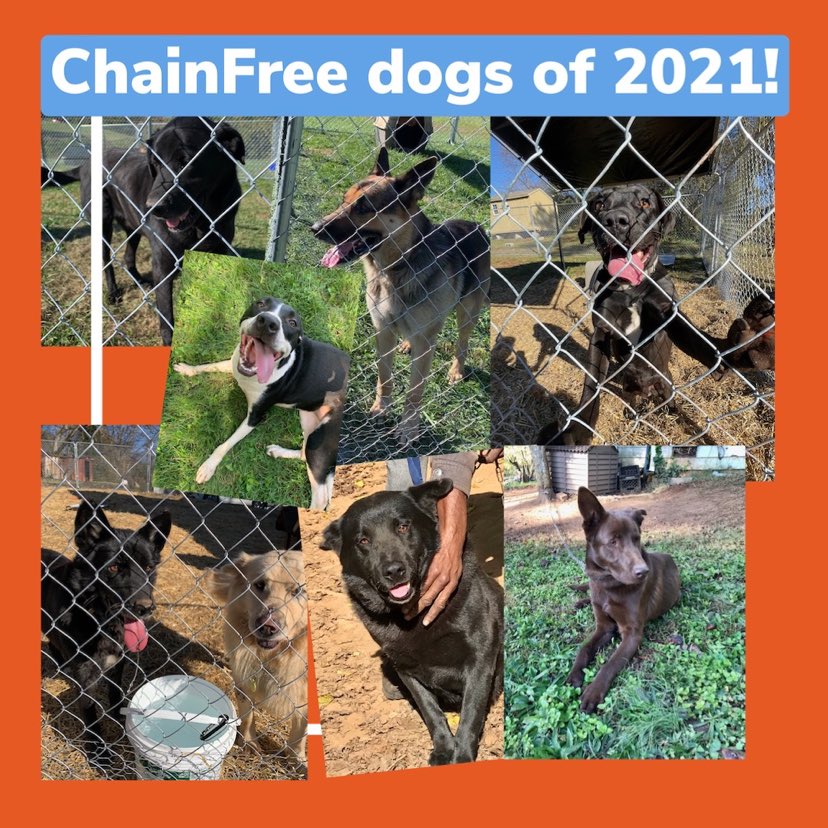He guarded his turf in every kind of weather. Chained to a ramshackle doghouse that provided little more than a roof, he barked ferociously when I walked by. He sweltered in the summer, shivered in the winter and was always alone. I called animal control. They knew about him, but said he was being fed and had access to shelter – such as it was – so there wasn’t much they could do. He grew old on that chain, barking at shadows.
His release came the only way it could, and all that was left to remember him was a little cross and a pile of dirt marking the spot where the doghouse used to be.
Julia Roy is more tenacious than I was. Last year, she saw a notice about a sad, chained-up dog on one of her Holston Hills neighborhood pages and started asking questions. This was how she heard about Janna Cecil, a city codes inspector and fellow dog lover. She got in touch and learned that Cecil was getting ready to leave her job and take up a new vocation – getting dogs off chains.

Nala was tethered until ChainFree Knoxville built a fence.
“Janna had been looking at starting a non-profit, ChainFree Knoxville group ever since she saw a dog that had jumped over a fence while chained, hung itself and died. That really gave her a big heart for chained dogs,” Roy said.
Kyle Lang is another leader who has joined up with ChainFree. She wrote the ordinance presented at the council workshop and serves as spokesperson, as well.
Later in the year, they were joined by Tonya Chapel, who’d done a lot of volunteer work for Off the Chain in Georgia. She helped get the movement out of the planning stages.
“We didn’t actually start building fences till November, but Tonya is an amazing volunteer and really got us going. She’s been really integral,” Roy said. By the end of the year, they had freed and built fences for 15 formerly chained-up dogs. Here’s how they describe their mission (from their web site):
“ChainFree Knoxville was formed in response to the hundreds of chained dogs in our community. We are a grassroots organization with a heart and a passion for these dogs and our mission is to eliminate the unattended chaining or tethering of dogs in Knoxville. ChainFree Knoxville provides free fencing for eligible families with chained dogs. We support revised animal laws that ban unattended chaining or tethering.”

Nala now enjoys a fenced yard. She was the first dog set free by ChainFree Knoxville.
The Animal Welfare Alliance is the political arm of this effort, and its members are monitoring bills in Nashville and across the nation (Roy says Johnson City has better, stronger animal welfare ordinances than we do). They have created a playbook of best practices and having found that many communities have banned unattended tethering, they want Knoxville City Council to do the same. They say they have learned that this city has tougher protections for chickens than for dogs.
Recently, they have run into some unexpected roadblocks. City council member Janet Testerman, whose day job is managing Young-Williams Animal Center, said she worries about how such a ban will affect dog owners who are struggling financially.
Captain Don Jones of the Knoxville Police Department says that agency doesn’t have the personnel to monitor tied-up dogs.
Jessica Hyder, Tennessee director of the Humane Society of the United States, echoed Testerman’s concerns and said that although her organization is on record supporting a tethering ban, it is in the process of re-evaluating that stance and will come out with a new policy that is more sensitive to the problems faced by poor people sometime this summer.
Testerman is concerned that a strict tethering ban could lead to more pets being surrendered. Hyder doesn’t want to criminalize poverty. Jones doesn’t want to pile dog-babysitting onto his already overworked officers. Council member Amelia Parker is worried about dogs who live on the streets with unhoused owners. These are serious issues.
But nobody should write ChainFree Knoxville off as a bunch of bleeding-heart do-gooders. They are uncommonly smart, hard-working and knowledgeable. Julia Roy’s got shocking statistics showing chained-up dogs are a public safety issue because they are more likely than other dogs to become violent – 30 percent of children killed by dog bites are bitten by tethered pets. The Tennessee Valley Humane Society supports a tethering ban, as do several veterinarians and Pittman Properties, one of the city’s largest and most respected landlords.
Working out an acceptable compromise won’t be impossible, but it won’t be easy.
Betty Bean writes a Thursday opinion column for KnoxTNToday.com.

